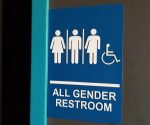Trump’s Bigoted Ban Isn’t the Only Obstacle That Trans Soldiers Face When They Try to Serve Their Country
This past August, Broadly‘s Diana Tourjee traveled to Fort Hood, Texas to interview Rachel Waverly, a former soldier who believes that her discharge for a “personality disorder” was used as a cover for discharging her based on her gender identity. As Broadly summarized, “Even though Rachel’s dismissal was in motion months before Trump’s proposed ban was announced, her story highlights how current military bureaucracy makes it easy to get rid of anyone deemed ‘unwanted’ by the military—with or without an official ban.”
Rachel did not initially expect to be able to serve openly. “I went in fully expecting that I would have to conceal my gender identity for as long as my service commitment was,” she says in the short documentary, “and that I’d never be able to openly serve as a transgender soldier.” Then, when the U.S. military announced in June of 2016 that they would allow transgender soldiers to serve openly, she met with military doctors, was diagnosed with gender dysphoria, and prepared to start transition.
However, she hit constant roadblocks and unexpected delays in her quest for care. “Access to treatment can depend on how good or bad the relationship is between a service member and their commanding officer,” explains Tourjee. While another trans soldier she speaks to in the documentary had a notably smooth and positive experience with her transition, the fact that the military requires command approval means that the safety of trans soldiers is left up to luck, rather than guaranteed as their right.
There’s a lot about this video that is heartbreaking, but one part hit me the hardest. Rachel is now living in a hotel, because her family will not accept her, and she doesn’t know what her future holds.
“So what is your plan?” asks Tourjee.
“I mean, I don’t know,” says Rachel. “I would love to be able to see myself in a public service position again, whether that be as a paramedic or a firefighter … It feels very uncertain.”
The fact that Rachel’s thoughts immediately went to public service – rather than to security and stability for herself – just broke my heart. This is someone who wants to help her country, who wants to serve, and out of sheer bigotry and administrative caprice, she isn’t being allowed to. Trump tried to justify his bigoted ban – currently blocked by a federal judge – by complaining about the imaginary waste and “cost” of treating trans soldiers, but here is the very real human cost, the very real waste of all Rachel’s potential and patriotism.
(Via Broadly; featured image via YouTube thumbnail)
Want more stories like this? Become a subscriber and support the site!
—The Mary Sue has a strict comment policy that forbids, but is not limited to, personal insults toward anyone, hate speech, and trolling.—








Comments are closed.